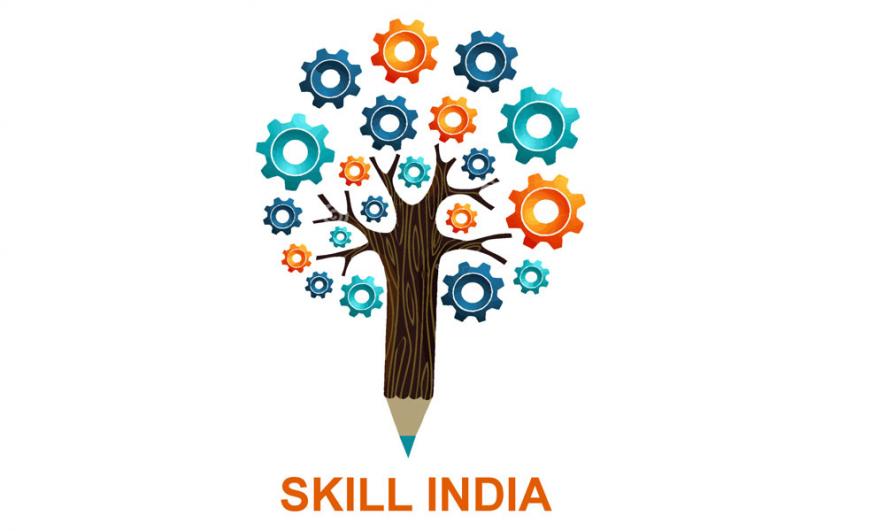In Rajasthan, Only One-Third of Trained Youth Got Jobs Under 3 Skill Development Schemes: CAG

In keeping with the failure of the skill development programme at the national level, the skill programmes in BJP-ruled and poll-bound Rajasthan, too, have failed.
A report by the Comptroller and Auditor General (CAG) of India — on the Rajasthan’s general and social sector for the financial year ending March 31, 2017 — reveals that the three skill training programmes running in Rajasthan achieved less than half of their training targets during 2014-17.
Of the youths who were trained, only a little over a third got job placements — of which only 37.45% placements were found to be genuine.
The three programmes being run by the Rajasthan Skill and Livelihoods Development Corporation (RSLDC) — the nodal agency for the state’s skilling initiatives —are:
(i) Regular Skill Training Programme (RSTP) — aimed at training people for self-employment.
(ii) Employment Linked Skill Training Programme (ELSTP) — to train youths in various skill sets, with the private training partners being responsible for providing employment to a minimum number of trainees.
(iii) Pandit Deen Dayal Upadhyaya Grameen Kaushalya Yojana (DDU-GKY) — a centrally sponsored skilling scheme for the rural poor.
No Monitoring of Training Partners
What’s worse, the CAG said the state government had failed to monitor and hold to account the private sector training partners, with whom it has tied up to run the skill training programmes — even as they failed to provide the minimum agreed upon job placements.
Rajasthan’s population has a huge chunk of youth — 55% of its population is aged below 25 years, as per the 2011 Census, and there were 33 lakh unemployed youth in the state, as per the same Census. Skill development schemes have been promoted as key to providing employment and livelihood in the state.
In fact, an expenditure of Rs 189.81 crore was incurred on the three skill training programmes during 2014-17, the CAG report said.
Failure To Meet Targets
Based on the data provided by the state’s Department of Skill, Employment and Entrepreneurship, the CAG report says the three programmes together achieved only 48.90% of their targets in the three years during 2014-17.
Specifically, RSTP managed to train 14,134 youths out of the targeted 26,000 (54.36%), ELSTP trained 1,27,548 out of the targettd 2,30,000 (55.46%), while DDU-GKY trained 32,418 out of 1,00,000 (32.42%).
The total target of the three programmes during 2014-17 was to train 3,56,000 people in various skills, however, only 1,74,100 people were trained.
As the CAG report said, “The target set may be viewed in the context of the gap study conducted by National Skill Development Corporation (NSDC-2012) which stated that the requirement of total skilled people was 24 lakh by the end of 2017.”
Inadequate Emphasis on Key Sectors
A total of 12 key sectors were identified for Rajasthan — by the skill gap study reports of ICRA Management Consulting Services Limited and National Skill Development Corporation — in which workers would be required to be provided with skill training.
These 12 key sectors were construction, textiles, healthcare, auto mechanics & engineering, tourism & hospitality, handicrafts, food processing, mines & minerals, gems & jewellery, banking & financial services, retail, and IT.
However, only 55.74% of the skill trainings under the three programmes were conducted in these identified key sectors.
Under RSTP, only 14.19% of the trainings were done in key sectors, while under ELSTP it was 55.78%.
As for the centrally-sponsored DDU-GKY programme, 73.67% of the trainings were conducted in these 12 key sectors.
The CAG report says, “Higher number of training programmes in key sectors under DDU-GKY was due to more stringent condition in the scheme guideline to ensure 70 per cent employment to the trained youth.”
“This shows that RSLDC did not give adequate emphasis to the key sectors in its two main skill development training programmes i.e. ELSTP and RSTP. Thus, failure to give adequate emphasis to the key sectors identified by the skill gap study could have been one of the reasons for reduced availability of placements after skill trainings under ELSTP and RSTP,” it said.
Failure of Private Training Partners
As per the guidelines of these programmes organised by the RSLDC, each programme was to provide employment to a minimum number of its trainees. For RSTP and ELSTP, it was a minimum of 50% employment while it was 70 % under DDU-GKY, all for the minimum period of three months, within 45 days of completion of the training programme.
What’s more, as per ELSTP guidelines, every placement made by the Training Partners was to be verified by the RSLDC’s Placement Verification Cell (PVC) through telephone. Besides, a minimum of 20% placements were to be physically verified.
As of August 2017, however, the RSLDC was able to meet only 66.27% of the minimum employment requirement.
Of the total trained youth, only 35.58% were employed.
As for verification, data regarding verification of the placements by PVC under RSTP and DDU-GKY was not made available to the CAG.
But the data for verification of placements under ELSTP during 2014-17 was available. It shows that only 61.85% of the placements (26,444 out of 42,758) under ELSTP were verified by PVC through telephone.
Even more dismally, only 37.45% of the verified placements (9,904 out of 26,444) were found to be genuine placements. “This shows that the employment figures reported by RSLDC in its reports were incorrect to that extent,” said the CAG.
Moreover, the PVC did not carry out the mandatory physical verification of 20% placements. “Hence, in the absence of physical verification by RSLDC, the authenticity of the telephonic verifications could also not be validated,” says the CAG.
Failure to Monitor Private Training Partners
The RSLDC has established a mechanism to conduct skill training programmes through 300 enlisted private Training Partners (TPs), said the CAG report.
“RSLDC would convey the sector/area for training courses and TPs would come up with proposals for training programmes, establishing Skill Development Centers (SDCs), and conducting training programmes.”
As per the ELSTP guidelines, the RSLDC is supposed to review the performance of the TPs. Besides, no programme was to be allotted for a minimum period of six months to TPs who failed to provide minimum 35% of placements after training.
But the RSLDC failed to monitor the TPs, who failed to provide the minimum 50 per cent of employment after completion of the training programmes.
The CAG report says that the mandatory 50 per cent employment was not achieved in 2,689 (56.59 per cent) out of 4,752 batches during 2014-17.
The placement ratio was less than 35% in 1,068 batches and no placements were made in another 530 batches. “RSLDC was to review all those batches and their TPs for their performance,” said the CAG.
“This shows that RSLDC was not monitoring the performance of TPs. RSLDC should have scrutinized the TPs for their capacity to provide placement before handing them the training programmes, as 56.59 per cent of batches conducted, do not have the required placement ratio.”
The CAG report said that the Government of Rajasthan stated in November 2017 that the review of the TPs’ performance was inadequate as the government did not receive complete details from the TPs. The state government added that it had taken action against 10 TPs in 2015-16 and against 30 TPs in 2016-17. However, the CAG did not buy the government’s response.
“The reply is not acceptable as despite having 2,689 non-performing batches (relating to 133 TPs) with less than 50 per cent placements during 2014-17 action against only 40 TPs was taken, which was inadequate,” said the CAG report.
“Further, as a result of not taking action against the non performing TPs, the number of batches with less than 50 per cent placements increased from 43.69 per cent in 2014-15 to 58.60 per cent in 2016-17.”
CAG Raps State Govt
Moreover, as per ELSTP guidelines, the Assessment and Certification (A&C) was to be done by an independent third party — approved by the National Council for Vocational Training or the Rajasthan Council for Vocational Education and Training (RCVET) or the Sector Skill Council or the RSLDC.
“But no evidence of conducting A&C was available on the records of RSLDC,” said the CAG. Accepting this, the Rajasthan government said, in the words of the CAG report, that “only a few agencies in few sectors conducted the A&C for State funded schemes. Accordingly, A&C for only 1,172 batches (34,953 trainees) were conducted during 2014-17. It was further stated that trained youth would be assessed by independent third party from 2017-18 onwards.”
Finally, there is the matter of the District Level Skill Development Committees under the District Collector. These committees were established to review the progress of the Skill Development Centers, and were required to hold meetings every month to monitor the training programmes.
“However, only 38 per cent of the required number of meetings was held and no records of follow up on the decisions and recommendations taken in the meetings were available with RSLDC,” said the CAG.
The state government said in response that it was difficult to hold monthly review meetings, given the vast responsibilities of the District Collectors,.
“The reply is not acceptable as the Department should have identified a suitable alternate authority to hold review meeting given the importance of monitoring of the training programmes at the district level,” said the CAG.
Get the latest reports & analysis with people's perspective on Protests, movements & deep analytical videos, discussions of the current affairs in your Telegram app. Subscribe to NewsClick's Telegram channel & get Real-Time updates on stories, as they get published on our website.
























